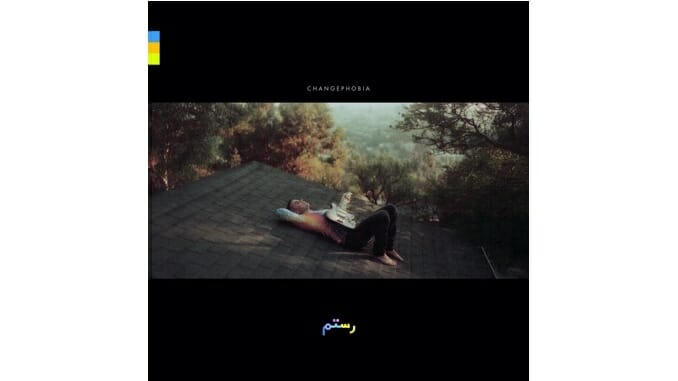Rostam’s Restraint Is Both Friend and Foe on Changephobia
The production wizard’s second album is his most compact work yet, which is alternately a boon and a crutch
Music Reviews Rostam
“In the last five years, something that has been on my mind is the concept of less is more, in the unit of the song and the unit of an album,” Rostam Batmanglij told W Magazine shortly after he announced his sophomore solo LP, Changephobia. Listening to the album—his first following his extensive co-production and co-writing work on Clairo’s Immunity and HAIM’s Grammy-nominated Women in Music, Pt. III—you can hear exactly what he means. Whereas his official solo debut, 2017’s Half-Light, retained much of the nomadic, mildly chaotic dynamism he brought to Vampire Weekend’s first three albums as its founding producer, Changephobia feels smaller-scale on every level. It’s 14 minutes shorter than its predecessor, and it’s light on the warbled, bursting electronics that defined Half-Light’s hazy tales of queer romance. It feels quiet and intimate even when it’s roaring.
“Unfold You,” the album’s lead single, hinted at this direction upon its release last year. Built on a sample of a Nick Hakim instrumental, the track’s roaming baritone sax and featherlight pianos brush against Rostam’s falsetto so gently that of course the opening lyric is “Spent the day in bed running through my head.” The music might as well not be there (much in the way that, on Frank Ocean’s “Ivy,” Rostam’s guitar comprises almost the entirety of the song), and that’s exactly its beauty. This minimalism persists through Changephobia’s most ebullient moments: “Kinney” sounds like a runner’s heartbeat outpacing their legs, and that’s with only arhythmic drums, a bellowing sax and a diamond-clear guitar under Rostam’s voice until, in its final minute, the song becomes a distorted romp.
Like much of Changephobia, “Kinney” traffics in images of passing trucks, falling asleep in cars and being in a state of physical motion despite mentally being fixated on one thing—in Rostam’s case, a person whose life we barely come to know besides the piles of clothes constantly accumulating in the backseat of their car. This lyrical economy aligns with Rostam’s newfound interest in scaling back, and it’s effective when he applies it from the passenger seat. “Last time we did it / We both felt it hit different / Lying down across the front seat / Used to leave you weightless and listless,” he sings on “4Runner,” which is the closest Changephobia comes to emanating the warped exuberance and just-woke-up-hair-still-a-mess lust of Half-Light. It’s a stanza that peers directly into the fizzling sexual, and ostensibly emotional, bond between Rostam and the person he’s with. “From the back of a cab to the airport / I am happy we got this hour,” he sings atop the restrained electronic explosions of “From the Back of a Cab,” and this beautiful sentiment fits the special joy of brief encounters into an equally succinct package, one so compressed that Rostam’s sincerity can’t help but bleed out.
It’s when Rostam goes small-scale from other angles that Changephobia’s lack of space begins to suffocate it. The album shares Half-Light’s biggest crutch: Rostam’s tendency to land on the wrong side of the balance between ambiguity and disconnection. “I want you / And I want to / And I’m happy / When you’re near me,” from the jazzy ballad “Bio18,” is simultaneously vague and so straightforward it doesn’t carry much weight. “Starlight, whenever we hang out / Starlight, a hundred sparks surround me,” he sings on saxes-and-snaps closer “Starlight,” but the commonplace imagery undercuts the emotion underlying it all.
“I learned I wasn’t so strange / Nothing I should hide from myself,” Rostam sings amidst the psychedelic hop-skip of “Changephobia.” When he’s roadside, whether his music emulates his passing trucks or his nights sleeping in the backseat, he’s indeed an open book, and an engrossing one at that. When he’s elsewhere, he gets so stuck in his own head that little more than his most rudimentary thoughts emerge, and you get the vibe that he could stand to spend more time listening to himself. “By altering just a few words, or even phrasing, you might make the meaning even clearer,” Rostam told W Mag about the art of lyric writing. If only he took his own advice more often.
Sometimes, Max Freedman sits and writes about music, and sometimes he just sits. Follow him on Twitter, where he has been hailed as “an incredible person with an incredibly bad internet connection.”